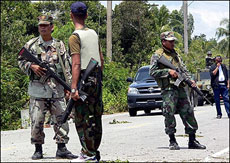|
Thailand Declares Emergency Rule in Muslim Provinces
 |
|
Instead
of announcing "emergency zones" the government declared
emergency rule across virtually the whole of its Muslim south.
|
CAIRO,,
July 18, 2005 (IslamOnline.net) – The Thai government declared
emergency rule across virtually the whole of its Muslim-majority south
in a surprisingly tough move amid growing local and international
criticism, The Nation paper reported on Monday, July 18.
It
declared emergency in Narathiwat, Yala and Pattani, the only Muslim
majority provinces in the country, instead of announcing
"emergency zones" within the provinces as had been expected.
"The
decree will cover every district in the three provinces, plus four
neighboring districts in Songkhla province. Those districts also need
monitoring, because something could happen," Interior Minister
Chidchai Vanasathidya told reporters.
Chidchai,
who oversees security matters, said a newly formed Council of
Ministers -- comprising interior, defense and justice ministers among
other -- will meet later Monday to set out the details on implementing
the new orders.
He
said the authorities initially will focus on limiting the movement of
people in the region and on news reporting of the unrest.
The
emergency was declared under a controversial decree rubber-stamped
Friday, July 15, by a hastily convened cabinet meeting.
It
grants Premier Thaksin Shinawatra the power to declare emergency zones
where authorities would have powers to tap phones, search and arrest
without warrant, impose curfews, censor news reports, ban public
gatherings and close premises.
Thailand
is a predominantly Buddhist nation but Muslims make up about five
percent of the population and mostly live in the five southern
provinces bordering Malaysia, which has been under martial law since
January 2004.
The
southern region was once an independent Muslim sultanate.
Constitutionality
 |
|
"The way the decree was approved
makes people suspicious and encourages mistrust of government, "
said Panyarachun.
|
The
new law has prompted strong reactions from civic groups charging it
violates many basic rights and could escalate unrest, The Nation
said.
The
Campaign for Popular Democracy and its allies plan to file a case with
the Constitution Court’s ombudsman this week challenging the
constitutionality of the law.
But
if parliamentarians decide to take action first, the groups will not
file the case, said Suriyasai Katasila, the campaign’s
secretary-general.
The
government bypassed parliament by making the new law an executive
decree, rather than an act of legislation.
Nirand
Pitakwatchara, the chairman of the Senate’s Social Development and
Human Security Committee, said the Senate would debate the executive
decree.
Also,
a group of Senators plan to gather signatures from one-fifth of the
200 members in the upper house asking the Constitution Court to rule
on whether the decree is unconstitutional, the paper said.
Mass
Resignation
The
Senators have urged the National Conciliation Commission (NRC), which
has championed peace in the deep south, to take action, saying the new
law made its work irrelevant.
"Issuing
such a law means Prime Minister Thaksin has rejected the NRC, taking
the opportunity to consolidate his power," Nirand said.
Suriyasai
suggested on Sunday that the commission’s members should resign in
protest over the government’s move.
The
NRC’s chairman, Anand Panyarachun, is scheduled on Monday to chair
a working group meeting on the issue, and a mass resignation might be
discussed, said Piphop Thongchai, a commission member.
Anand,
a respected former prime minister, said the decree had raised
suspicion of the government among residents in the mainly Muslim
provinces.
"The
way the decree was approved makes people suspicious and encourages
mistrust of government. If the decree had been passed with
parliament's approval, or in consultation with the NRC, people would
feel better," he told reporters.
The
Nation quoted another NRC member as
saying that the government had broken an agreement that it would
consult the panel on any attempts to terminate martial law and replace
it with new laws aimed at curbing violence in the south.
"He
(Thaksin) promised to seek advice from us, but he didn’t,"
Paisal Promyong said.
"So,
how can we trust the prime minister when he imposes this executive
decree in such an improper way, that he won’t use it to abuse other
people?"
Critics
at home and abroad have accused the Thai government of using
heavy-handed tactics against Thai Muslims.
The
International Crisis Group (ICG) stressed on Thursday, May 19, that
the Thai government's failure to address injustices and open a genuine
dialogue with Muslim leaders in the south is the real reason behind
unrest in the country.
Thailand's
national rights watchdog also accused the army of "violent
breaches of human rights" against Muslims in the south.
Read
also on the topic:
|